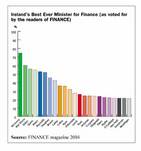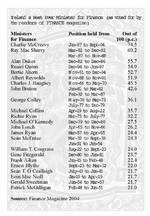|
|
Wednesday, 4th March 2026 |
| History's influence on poll results |
Back |
| John Considine, a lecturer in public finance at University College Cork, whose main area of interest is Minsters for Finance, examines the performances of the 23 ministers, which may account for how the votes were cast in FINANCE's 'Best Ever Minister for Finance' poll. |
What a wonderful exercise. Who was the best of them all? The question is more frequently applied to footballers than to Ministers for Finance. Roy Keane or Johnny Giles? Pele or Maradonna? In the context of Athens 2004 there seemed to be consensus that Sonia O'Sullivan is our greatest ever athletic although you could get support for John Treacy, Eamonn Coughlan or Ronnie Delaney depending on the gender, birthplace and age of the person declaring their judgement. Now it is 'official', Charlie McCreevy is deemed our greatest Minister for Finance. | | Ray MacSharry, who was voted the second 'Best Ever Minister for Finance'. |
Like all polls of this nature, a rough approximation of the results can be had by ranking the Ministers for Finance in reverse chronological order. This is the usual reason provided by those who turn their noses at such polls and claim that they are unscientific. But that is to ignore the nuggets of information presented in the results. What can explain why some Minister does better, or worse, than is suggested by the passage of time? The results also give plenty of clues as to what a good Minister for Finance is likely to look like. While the results are unlikely to have Bertie beating a path to McCreevy's door with an apology and a plea for him to turn his back on Europe, they can provide clues about the likely success of his successor. | | Charlie McCreevy |
The passage of time has obviously played a role in the results. It is like the difference of opinion about David Beckham likely to be solicited from teenagers and pensioners. More recent players attract greater support. If we take John (Jack) Lynch as the first of a continuous line of non-Civil War participants to hold the post then we find that all those who succeeded him are ranked above him with the exception of Gene Fitzgerald. All those who held the post before Lynch are ranked below him with the exception of Michael Collins. The ranking of Collins and Fitzgerald suggests that larger and stronger political personalities are viewed as better Ministers for Finance.
Collins is the biggest winner when we compare his ranking with the chronological ordering of the Ministers for Finance. Much of this could be attributed to the fact that his name is one of the most recognisable of the 20th century Irish political figures. A similar line of reasoning can be applied to the other big winners - William T. Cosgrave and Charles J. Haughey. Both are amongst a handful of leading figures in their respective parties for the period under consideration. However, Collins's relative ranking is far greater than that of Cosgrave or Haughey. I would suggest it is even larger than his cult status or any Neil Jordan influence can explain. On the evidence presented here it is probable that respondents gave Collins credit for his part in the first National Loan that was raised under extremely difficult circumstances, his negotiation of the financial parts of the Treaty and his presiding over the establishment of Finance as the pre-eminent department during the early part of 1922. | | Ireland’s Best Ever Minister for Finance (as voted for by the readers of FINANCE) |
Collins probably also benefited from another critical factor in any historical judgement, namely, the environment in which the Minister operated. Exceptional circumstances contribute largely to the public's perception. There is little doubt that McCreevy, and to a lesser extent Quinn, have received credit for the Celtic Tiger. MacSharry seems to have been credited with correcting the unsustainable fiscal imbalance of the 1980s. It seems Dukes also gained some kudos for his efforts although I wonder to what extent this credit is due to his time as Minister for Finance as against his Tallaght Strategy as leader of the opposition. It is possible that his behaviour in opposition shone a more favourable light upon his time in Finance. From the earlier period it seems that Eoin MacNeill got some credit for being selected as the first Minister for Finance despite the fact that he did, or could do, nothing between the first meeting of the Sinn Fein members in January and their second meeting in April when he was replaced by Collins.
The biggest losers in the survey results are Gene Fitzgerald, Patrick McGilligan and Gerald Sweetman. Rightly or wrongly, Fitzgerald was not perceived to be an independent force in Finance for his short period in that office. The widespread view was that he was done the bidding of Mr Haughey. It is possible that a similar perspective was taken on McGilligan. Yet, McGilligan's period in Finance during the first Inter-Party government coincided with one significant development in Irish budgetary policy. It was during this time that the capital and current budgets were formally separated, thereby, allowing the potential adoption of Keynesian type policies. It, therefore, seems odd that McGilligan ranks last of the 23 ministers. It is possible that the separation of the accounts were not seen as McGilligan's work. This is not surprising given that the departure in budgetary policy is viewed as being the product of the support team of Patrick Lynch and Alexis Fitzgerald. McGilligan did not even announce the change with that task completed by the Taoiseach, John A. Costello. I wonder if McGilligan would have suffered the ignominy of coming last if his role in helping Collins, via Joseph Brennan, undermine the British arguments in the financial negotiations were known.
Gerald Sweetman is unusual in that he was the only pre-Lynch Minister for Finance not to have taken an active part in the events of 1918-21 (he was only 10 years of age in 1918). He was appointed only after McGilligan turned down the post. His mistaken attempts to address the balance of payments problems by budgetary means probably contributed to his poor ranking. In this respect the public should probably be more forgiving in that it was only decades later that Patrick Honohan and Cormac O'Grada discovered that the problem was a monetary rather than a fiscal one. | | Ireland’s Best Ever Minister for Finance (as voted for by the readers of FINANCE magazine) |
One other interesting feature of the results is the relative placing of John Bruton compared with James Ryan, Sean MacEntee and Ernest Blythe. Ryan, MacEntee and Blythe all served as Minister for Finance for more than seven years. By contrast, John Bruton failed to bring in the traditional budget on two separate occasions (although he did bring in an important supplementary budget during his first period in office). On the first occasion, the government fell over VAT on children's shoes. On the second occasion, the Fine Gael Labour coalition officially spilt over the contents of his budget. Unlike the first failure this was a pre-election strategy. Yet, Bruton is ranked 8th while Ryan, MacEntee and Blythe are ranked 14th, 15th and 19th, respectively. It is possible to again appeal to the passage of time and the fact that Bruton's stature is enhanced by his becoming Taoiseach. However, there may be more to it. Bruton's first budget was probably the most dramatic budget day in our history. Ryan's budgets were not memorable while both MacEntee and Blythe were seen as fiscally conservative northerns. It is hard to remember the unmemorable and people wish to forget the struggle with economy. This is a lesson the more memorable minister knew. Over thirty years later many remember, or have heard of, the Haughey budgets with their favourable treatment of the stallion owners, the artists, and the pensioners. McCreevy brought budget day surprises to an unprecedented level and he would slip a couple into the Finance Bill for good measure. Even Ruairi Quinn realised the benefits of removing some of the symbols of our UK inherited budget presentation. |
John Considine is a lecturer in public finance (economics) at University College Cork.
|
| Article appeared in the September 2004 issue.
|
|
|